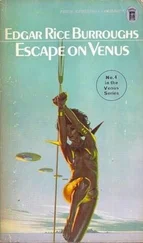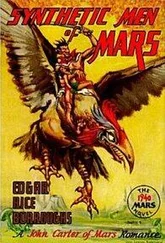Edgar Burroughs - Carson of Venus
Здесь есть возможность читать онлайн «Edgar Burroughs - Carson of Venus» весь текст электронной книги совершенно бесплатно (целиком полную версию без сокращений). В некоторых случаях можно слушать аудио, скачать через торрент в формате fb2 и присутствует краткое содержание. Жанр: Фантастика и фэнтези, на английском языке. Описание произведения, (предисловие) а так же отзывы посетителей доступны на портале библиотеки ЛибКат.
- Название:Carson of Venus
- Автор:
- Жанр:
- Год:неизвестен
- ISBN:нет данных
- Рейтинг книги:4 / 5. Голосов: 1
-
Избранное:Добавить в избранное
- Отзывы:
-
Ваша оценка:
- 80
- 1
- 2
- 3
- 4
- 5
Carson of Venus: краткое содержание, описание и аннотация
Предлагаем к чтению аннотацию, описание, краткое содержание или предисловие (зависит от того, что написал сам автор книги «Carson of Venus»). Если вы не нашли необходимую информацию о книге — напишите в комментариях, мы постараемся отыскать её.
Carson of Venus — читать онлайн бесплатно полную книгу (весь текст) целиком
Ниже представлен текст книги, разбитый по страницам. Система сохранения места последней прочитанной страницы, позволяет с удобством читать онлайн бесплатно книгу «Carson of Venus», без необходимости каждый раз заново искать на чём Вы остановились. Поставьте закладку, и сможете в любой момент перейти на страницу, на которой закончили чтение.
Интервал:
Закладка:
Duare said nothing. She was silent for a long time as we flew along the coast. Presently I saw the harbor.
"There it is," I said. "This is Vepaja, Duare."
"Vepaja," she breathed.
"We are here, Duare. Do you want to stay?"
She shook her head. "Not without you." I leaned toward her and kissed her.
"Where then?" I asked.
"Oh, let's just keep on going. One direction's as good as another."
The ship, at the time, was flying perhaps a couple of points north of west; so I simply maintained that course. The world ahead of us was absolutely unknown, as far as we were concerned; and as this course would keep us away from the antarctic regions and well into the northern part of the south temperate zone, it seemed as good a course to hold as any. In the opposite direction lay the stronghold of the Thorists, where we could hope to find only captivity and death.
As the long day wore away, nothing but illimitable ocean stretched monotonously before us. The ship functioned beautifully. It could not function otherwise, since into its construction had gone the best that the finest scientific minds of Havatoo could give. The design had been mine, as aircraft were absolutely undreamed of in Havatoo prior to my coming, but the materials, the motor, the fuel were exclusively Amtorian. For strength, durability, and lightness the first would be impossible of duplication on Earth; the motor was a marvel of ingenuity, compactness, power and durability combined with lightness of weight; the fuel I have already described. In design the ship was more or less of a composite of those with which I was familiar or had myself flown on Earth. It seated four, two abreast in an open front cockpit and two in a streamlined cabin aft; there were controls in both cockpits, and the ship could be flown from any of the four seats. As I have before stated, it was an amphibian.
During the long day I varied the monotony by instructing Duare in landings and take-offs, there being a gentle westerly breeze. We had to keep a sharp lookout at these times for the larger denizens of the sea, some of which might easily have wrecked the ship had their dispositions been as fearsome as their appearance.
As night fell, the vast Amtorian scene was bathed in the soft, mysterious, nocturnal light that beneficent Nature has vouchsafed a moonless planet. Seemingly as limitless as interstellar space, the endless sea rolled to the outer rim of our universe, glowing wanly. No land, no ship, no living thing impinged upon the awful serenity of the scene—only our silent plane and we two infinitesimal atoms wandering aimlessly through space. Duare moved a little closer to me. Companionship was good in this infinite loneliness.
During the night the wind veered and blew from the south, and at dawn I saw cloud banks rolling in ahead of us. The air was much cooler. It was evident that we were getting the tail end of a south polar storm. I didn't like the looks of that fog. I had blind flying instruments on the instrument board; but, even so, who would care to fly blind in a world concerning the topography of which he knew nothing? Nor was I particularly keen to chance waiting the fog out on the surface of the sea. The chances are it would have been safe enough, but I had seen far too many leviathans cavorting about in the waters beneath us to incline me toward spending any more time on the surface of the water than was absolutely necessary. I determined to change our course and fly north ahead of the fog. It was then that Duare pointed ahead.
"Isn't that land?" she asked.
"It certainly has all the appearances of land," I said, after taking a long look.
"Maybe it is our island," she suggested laughingly.
We'll go and have a look at it before the fog rolls over it. We can always beat that fog if it gets too thick."
"Land will look pretty good again," said Duare.
"Yes," I agreed. "We've been looking at an awful lot of water."
As we approached the coast line we saw mountains in the distance and far to the northwest what appeared to be one of those giant tree forests such as cover almost the entire area of the island of Vepaja .
"Oh, there's a city!" exclaimed Duare.
"So it is—a seaport. Quite a good-sized city, too. I wonder what kind of people live there."
Duare shook her head. "I don't know. There is a land northwest of Vepaja that is called Anlap. I have seen it on the map. It lies partially in Trabol and partially in Strabol. The maps show it as an island, a very large island; but of course nobody knows. Strabol has never been thoroughly explored."
It seemed to me that none of Venus had ever been thoroughly explored, nor could I wonder. The most able men I had met here clung to the belief that it was a saucer-shaped world floating on a molten sea. They thought that its greatest circumference lay at what I knew to be the south pole, and on their maps the equator was not even a dot. They never dreamed of the existence of another hemisphere. With maps based on such erroneous reasoning, everything was distorted; and because their maps were therefore useless, no navigator dared go far from familiar waters and seldom out of sight of land.
As we approached the city I saw that it was walled and heavily fortified, and closer inspection revealed the fact that it was being beleaguered by a large force. The hum of Amtorian guns came faintly to our ears. We saw the defenders on the walls; and, beyond the walls, we saw the enemy—long lines of men encircling the city, each lying behind his shield. These shields are composed of metal more or less impervious to both r-rays and t-rays; and their use must result in far more mobile attacking forces than could have been possible were the men facing earthly bullets; it practically amounted to each man carrying his own trench. The troops could be maneuvered almost anywhere on the field of battle while under fire, with a minimum of casualties.
As we passed over the city, firing practically ceased on both sides. We could see thousands of faces upturned toward us, and I could imagine the wonder and amazement that the ship must have engendered in the minds of those thousands of soldiers and civilians, not one of whom could possibly have conceived the nature of this giant, birdlike thing speeding silently above them. As every portion of the ship, whether wood, metal, or fabric, had been sprayed with a solution of this ray-resisting substance I felt quite safe in flying low above the contending forces; and so I spiralled downward and, circling, flew close above the city's wall. Then I leaned out and waved my hand. A great shout rose from the men within the city, but the attackers were silent for a moment; then a volley of shots were directed at us.
The ship might have been coated with ray-resisting material; but Duare and I were not, and so I zoomed to a safer altitude and turned the ship's nose inland to reconnoiter farther. Beyond the lines of the investing forces we flew over their main camp, beyond which a broad highway led toward the southwest, from which direction troops were marching toward the camp; and there were long trains of wagons drawn by huge, elephantine animals, and men mounted on strange beasts, and big t-ray guns, and all the other impedimenta of a great army on the march.
Turning toward the north, I reconnoitered in search of information. I wanted to know something about this country and the disposition of its inhabitants. From what I had already seen, their dispositions seemed unequivocally warlike; but somewhere there might be a peaceful, hospitable city where strangers would be treated with consideration. What I was looking for was a single individual whom I might question without risking injury to Duare or myself, for to have made a landing among those fighting men would probably have been fatal—especially among comrades of the contingent that had fired on us. The attitude of the defenders of the city had been more friendly; but still I couldn't risk a landing there without knowing something about them, nor did it seem the part of wisdom to land in a beleaguered city that, from the number of its attackers, might be taken any day. Duare and I were looking for peace, not war.
Читать дальшеИнтервал:
Закладка:
Похожие книги на «Carson of Venus»
Представляем Вашему вниманию похожие книги на «Carson of Venus» списком для выбора. Мы отобрали схожую по названию и смыслу литературу в надежде предоставить читателям больше вариантов отыскать новые, интересные, ещё непрочитанные произведения.
Обсуждение, отзывы о книге «Carson of Venus» и просто собственные мнения читателей. Оставьте ваши комментарии, напишите, что Вы думаете о произведении, его смысле или главных героях. Укажите что конкретно понравилось, а что нет, и почему Вы так считаете.









